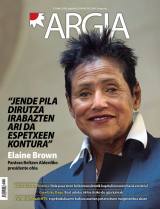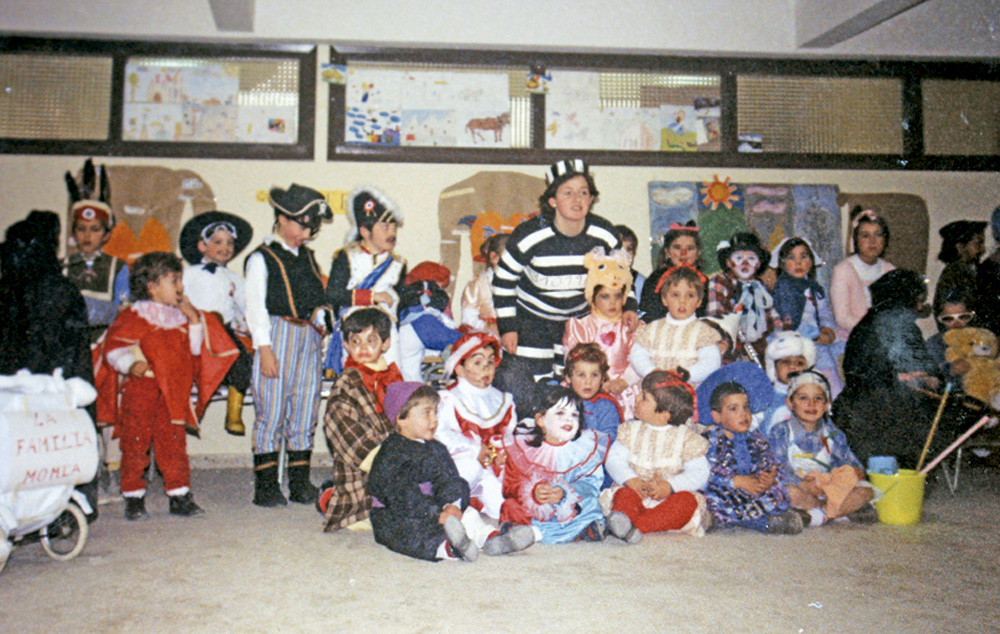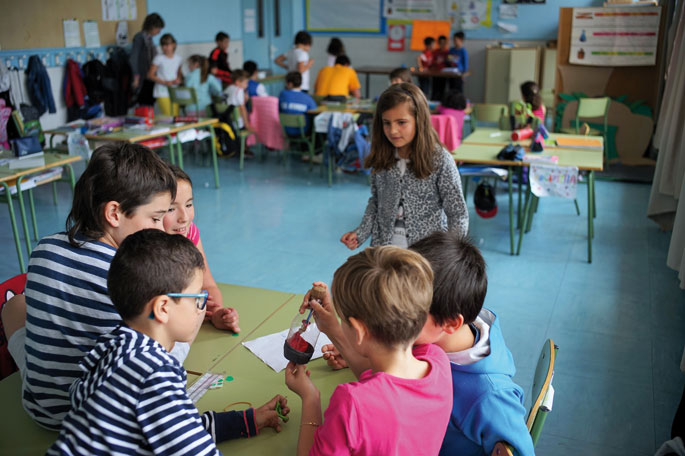Argantzon Ikastola is not a traditional ikastola
- It will be on June 17 under the title “Irrikitan” at the Commercial Center Treviño Araba Euskaraz. The Ikastola Argantzon will organize the Basque Araba for the third time. Many trebiñeses call their county adabakia, because administratively it's Burgos, and geographically it's in Álava. That’s why Ikastola Argantzon is not a normal ikastola.
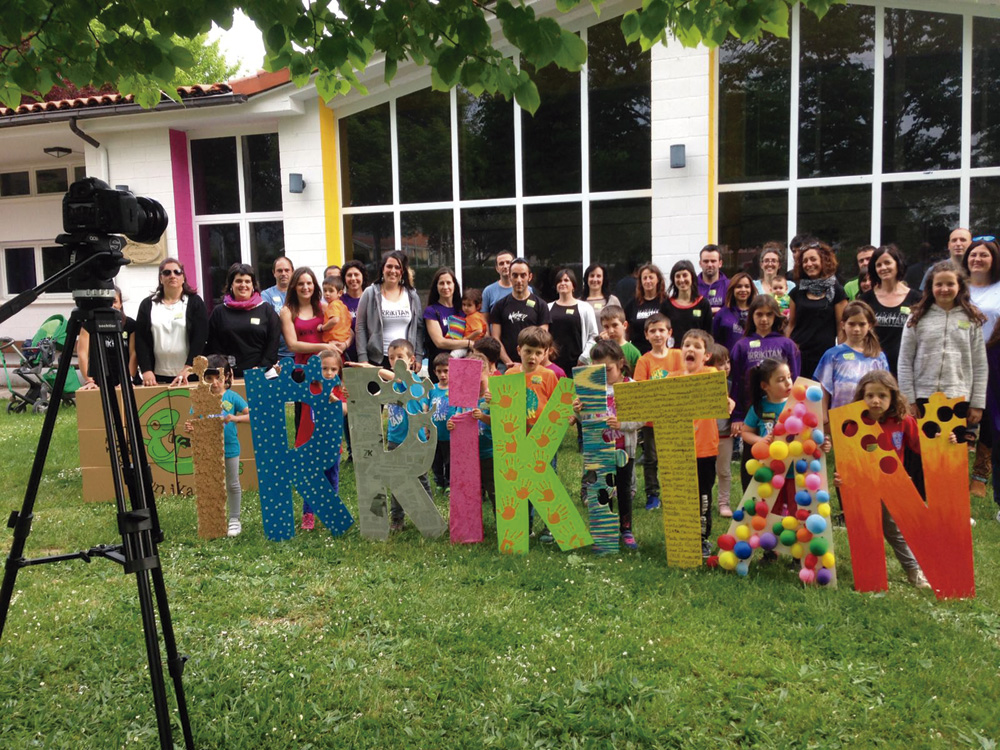
Many will not realize that the N1 will circulate in Álava in a seven-minute stretch, so the exit will take place between Araba-Milan-Álava. Treviño is a crossroads, according to some, the eighth Alavese crew. This is 7% of the territory's surface, consisting of 51 small towns belonging to the municipalities of Arganzón and Treviño.
ARGIA, 17. When Korrika left Trebiño, he interviewed Roberto González de Viñaspre, a member of the Euskaltzaindia and a member of the Euskaltzaindia de Euskaltzaindia. As he said, the Basque Country disappeared at the end of the 18th century in Treviño, in the context of a great loss of language that occurred from the bottom to the top in Álava. However, the scholar affirmed that the socio-linguistic survey conducted at the Graduate Studies Center yielded revealing and encouraging data: the Basques were 13%. In 2012, a new measurement was carried out in which Euskaldunes represented 22% of the total (39% of the bilingual recipients). In addition to a significant increase, the socio-linguistic data of the nearby counties are very similar to those of Treviño. This is an achievement that has been achieved for a number of reasons in a difficult situation.
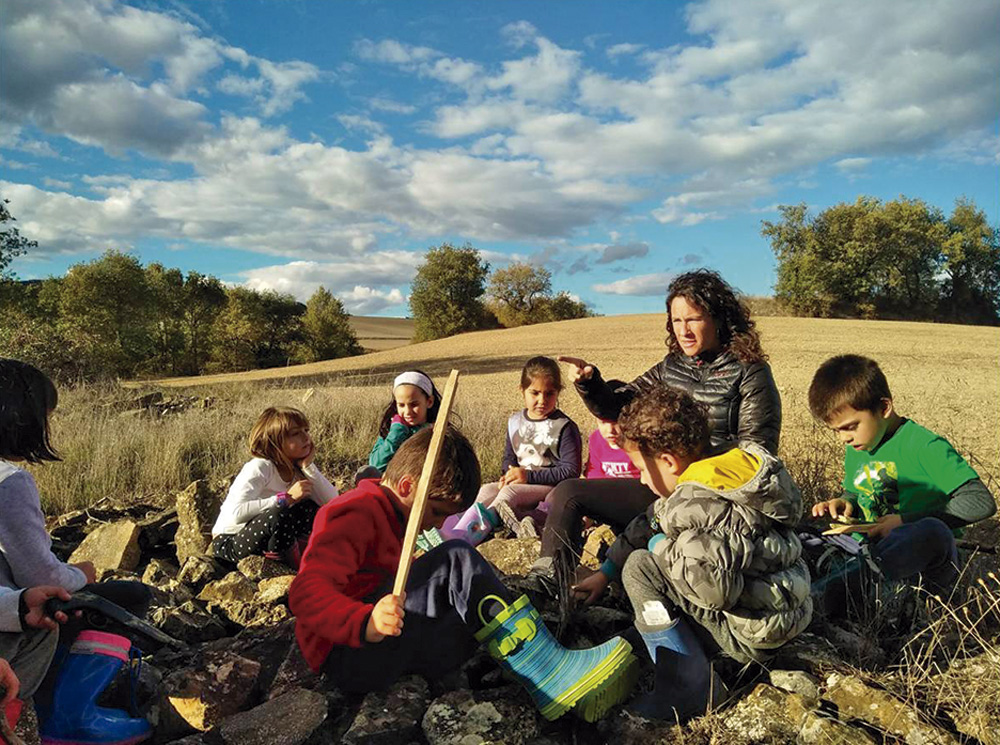
To get to know the political situation, we talked to Pablo Ortiz de Latierro. In the municipality of Arganzon he is a councilor for EH Bildu and member of the Trebiñu Araba Da movement, although the movement has recently stopped. In recent decades, numerous attempts have been made to unite Treviño with Álava, and in the 1998 referendum the inhabitants of Treviño expressed this will. In the city, all parties have been in favor of integration, but pp and PSOE have different views in the Basque Country and Spain. Four years ago, the Basque Parliament brought Treviño’s integration into the Spanish Congress, because Congress has the competence to authorize integration. But the answer was clear. Ortiz de Latierro has said that confrontation and popular activation are needed to achieve what has been demanded for years, but not all parties and institutions are willing to do so.
Taking into account the administrative situation in which they are located, the Provincial Council of Álava and the Provincial Council of Burgos have signed an agreement so that the citizens of the Fair can access the services of Álava. The issue is that health and education are autonomous competences (in this case the CAV and Castilla y León) and that the signed agreement is provincial. The Provincial Council of Álava is also unable to grant direct subsidies. Therefore, this convention does not cover all areas of the life of the Treviñeses.
Association of the Basque Country Gutxisolo and the Basque technician of the Centre
The Association of the Basque Country Gutxisolo has been one of the most important agents it has done in favour of the Basque Country and we have met with Pilutxi Ansotegi. 20 years ago Euskera classes were organized in the town of Treviño and some of its students created the association. Ansotegi pointed out that they had very little money at first, but that they were very eager to do so. In order to “bring the Basque country to the streets”, all kinds of activities were organized, especially for young people and children. The association has had about a dozen members, although five people have been actively involved in the work. They have had a close relationship with the ikastolas, and precisely those two agents have been the ‘euskalgintza’ of the center. For example, Ansotegi’s son was of the first generation of the Ikastola Argantzon, despite being a supporter of the Basque public school. But that cannot be done as part of Castile and León. “The institutions in Treviño are always patching,” he added.

The message they have received from some institutions has not always been polite, as Minisolo was asked to organize events in the Basque Country, regardless of the reality and rhythm of Treviño. Ansotegi says that the work of Gutxisolo has not been properly understood or promoted in municipalities: “They have drowned us.” It can be said that the activity of the members of the Gutxisolo association has ended so far, but it seems that there are young people who intend to revitalise the partnership. This is not an isolated case, as the Basque association of Añana, located in the area, has also had to abandon it. They also drowned.
The message they have received from some institutions is that they are not going to make an exception with Treviño. And the Treviñeses answered: “But Treviño is an exception.” Thus, in a meeting to organize the linguistic policy of Álava, the Gutxisolo association denounced the situation of the Basque country in the enclave of Treviño. After this protest, the Provincial Council of Álava hired an employee of the network of Basque technicians for the spell workshop and BEÑAT Goitia is the current technician. According to Ansotegi, Goitia was from the beginning what the Gutxisolo association needed, “but it’s come too late.”
The Basque technician is working part-time and aims to organize activities to promote the revitalization of the Basque country in both municipalities through the subsidies of the Provincial Council of Álava. With the agents of the two municipalities and the Durango Fair itself (Gutxisolo bera eta Txingoka Elkartea), he wants to promote the use of Euskera. For example, he promoted an ordinance with several councilors, so the municipal government of Arganzón took some steps, including making municipal bandes bilingual. Goitia says that the integration of Treviño is more logical than ideological. For example, in the public school of Treviño there are 60 children and, as you cannot study in Basque, the Treviñeses who wish to do so have to go to Vitoria and Nanclares, although in the villages of Treviño and Arganzón there are kindergartens in Basque. At the initiative of the City Hall, in the public school there are Basque classes once a week when it comes to eating, but it is not possible to do more under the administration of Castile and León, since the Statute only talks about Galician and Asturian. In any case, Goitia has thought that, despite not having the official status, things can be done.

Child Education in Arganzón, Primary School in Manzanos
After the closure of the public school of model A of Arganzón in 2001, the Municipality of Arganzón, in collaboration with the Federation of Ikastolas of Álava, concluded that there was the possibility and desire to create a ikastola in Arganzón. They hired a 25-year-old and very excited young man to get the kids from home and start from scratch. This young man was Ekaitz Lotina, current director, and was in May 2003. The course began on October 27, when the building still smelled of painting.
Although they started with eleven children and two teachers, in recent years they have had between 40 and 50 children, with seven teachers. They have been constantly changing their headquarters, “as in the old ikastolas”. It has not been an easy journey, every year they have had economic problems and the working conditions of teachers have not been good. They have survived thanks to the City Hall, the parents’ share and the solidarity fund of the Federation of Ikastolas, but there is still a profound structural lack: the total instability of the ikastola.
Will and militancy are the words that Ekaitz Lotina has constantly underlined. Ikastola Argantzon has told us that it will take a leap, since in addition to Early Childhood Education, it will also be taught Primary Education. They are hopeful because they think that the offer will double the number of students. However, the primary school will be held outside Treviño, in the village of Manzanos, 5 kilometres away. In Lotina’s words, “this is not a triumph of the Ikastola Argantzon, but to accept that the circumstances compel us to leave the barrenry and the improvements of the ikastola”. After fifteen years of work in Treviño County, they concluded that, for the time being, it is not possible to further develop the project there.
The 2018 Araba Euskaraz will be organized by themselves. The objective is to publicize the project, the situation and Treviño of the Ikastola Argantzon. In Lotina’s view, if defined with a word, the situation of the ikastola is “regrettable” and “something should be ashamed”. They have also considered that they are “chronic beggars”: “We are teachers, but we are talking about things that take many hours and a lot of energy to achieve stability.” Response they receive outside the ikastola: “Encouragement, applause, good words and sometimes money (before more).” They were about to lose the money that the City receives for promoting the Basque Country through the Basque Government. However, according to Lotina, since the new leadership in the Basque Government’s Department of Culture has been launched, relations are much better. Ikastola is officially regulated, but since it is not discharged from the CAV, the Department of Education cannot intervene directly and the situation is managed from the Department of Culture of the CAV.

He is also satisfied with the support of the ikastola, as the project that was promoted at the time by the municipal government of the PNV has also been supported by the Independents who are in the City Hall. In the village they are also happy, and although all the families that support the project do not go to the ikastola, for Argantzon it is important to have a school in the village. Despite the difficulties, the ikastola project has been consolidated and renewed. For example, from Vitoria-Gasteiz people also go to ikastola, as the pedagogy of trust, the free movement of children, the age mix and the close treatment use methodological lines that attract fathers and mothers.
The Araba Euskaraz to be held on June 17 is a unique opportunity to approach the “patch” that is 20 minutes from Vitoria-Gasteiz and learn about the situation of ikastola. Trebiñu is not yet a normal school. It is a project that has come forward with the will of the Treviñeses and with immense work, which calls into question stability and survival every day.
Ekainaren 17an ospatuko dute Araba Euskaraz Argantzunen. Bertako ikastolak Manzanosen duen Lehen Hezkuntzako eraikina ordaintzen laguntzeko baliatuko dute jaia.









